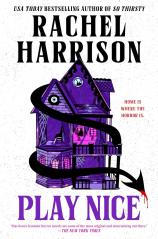Play Nice
Review
Play Nice
There is a blurb found on the cover of Rachel Harrison’s latest book, PLAY NICE, that refers to her “feminist horror novels.” I think this is extremely limiting and downplays the fine name she has made for herself within the horror genre, regardless of her gender.
PLAY NICE is primarily about a trio of sisters living in the wake of their mother Alex’s recent death and the allegations they grew up with about her being abusive, mentally unstable, and subjecting them to unwanted supernatural elements while growing up in their Connecticut home. Only the youngest sibling, Clio, is willing to attend her funeral. Clio's sisters and remarried father are against it and still harbor much resentment toward her.
"Rather than the expected battle of good vs. evil or human vs. demon, we get to experience a family finally coming together via shared memory as they realize who they really are and who they're supposed to be."
As she pays her respects, Clio learns that Alex never gave up ownership of the infamous “haunted” house they were raised in, and it has now been left to her. Clio, who has little to no memory of what occurred there, visits the house and begins renovating it before deciding whether or not to put it back on the market. While there, she comes across a copy of the nonfiction work that permanently scarred her family and allegedly details the events that drove Alex mad: Demon of Edgewood Drive: The True Story of a Suburban Haunting.
If you're like me, you'll get a very strong AMITYVILLE HORROR vibe from this. Like that book, the fictional one in PLAY NICE has long been debated as to whether or not what is depicted in it ever happened. Clio reads it with equal horror and delight, and readers get to enjoy passages from it throughout the story. You can clearly see why Alex's family forced her into estrangement and tried to minimize the damage to Clio. The problem is that Clio gets more resentful of this and opens up her mind to Alex’s plight, even as she begins to interact with a presence in the home that may have always been attached to her as well as to her mother.
The sale of a haunted house, or a house where any prior tragedy may have occurred, is a cliché in the real estate world, but it is not played for laughs by Harrison. Instead, Clio does her own research. Her only support during this troubling time is a former neighbor who may know more than he lets on about her mother and the inherited property.
Each of the events from the present and the past are depicted realistically and remain unsettling without being terrifying or distracting in any way. This sets up the plot for a final act that provides unexpected outcomes and leaves some matters unanswered in an effective way. Clio believes that she has serious decisions to make lest she end up like her mother --- giving in to despair and letting her mental and otherworldly demons win.
What I found most surprising about PLAY NICE, especially in the final act, is that Harrison stays away from convention. Rather than the expected battle of good vs. evil or human vs. demon, we get to experience a family finally coming together via shared memory as they realize who they really are and who they're supposed to be.
Reviewed by Ray Palen on October 11, 2025
Play Nice
- Publication Date: September 9, 2025
- Genres: Fiction, Horror, Supernatural Thriller, Suspense, Thriller
- Hardcover: 336 pages
- Publisher: Berkley
- ISBN-10: 0593642570
- ISBN-13: 9780593642573




